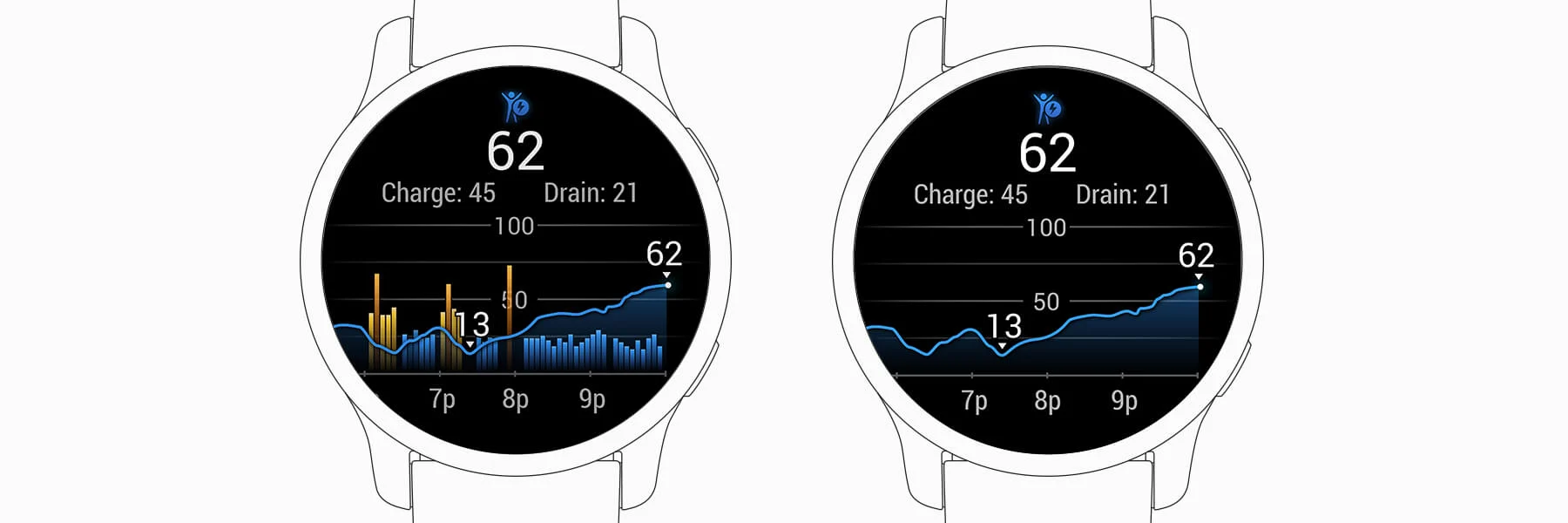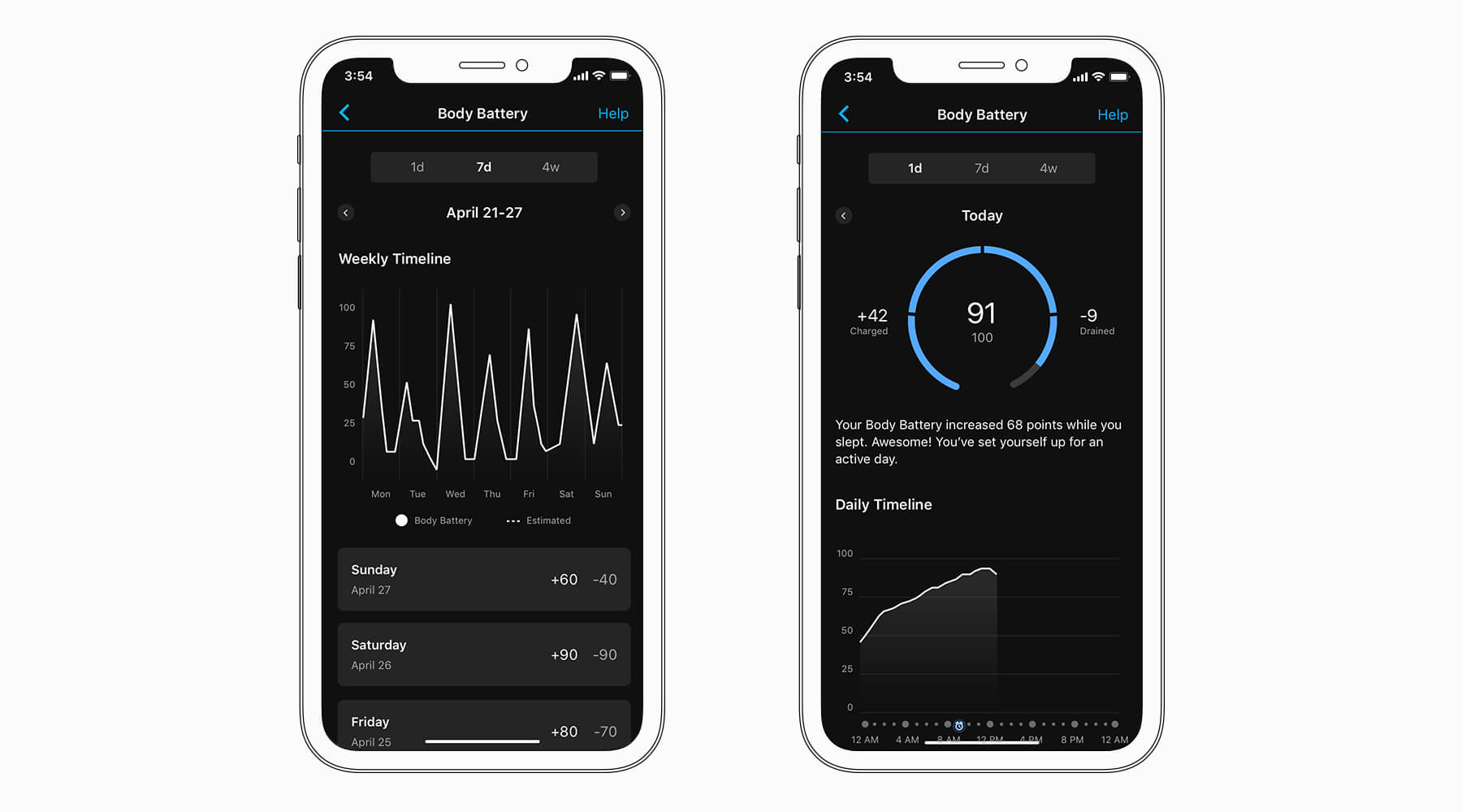
The Body Battery feature on your Garmin watch is designed to help you manage your personal energy resources around the clock. This means knowing when you are ready to benefit from a challenge and when taking it easy is the wise choice. By showing you the effects of physical activity, stress, relaxation and the restorative power of sleep together in a single place, Body Battery also lets you see how activities and lifestyle choices affect your state. That way, you can learn what works best for you.
Physical activity, stress, rest and sleep: Each has a discernible impact on your ability to keep pace, tackle challenges and adapt to your environment. Our Body Battery feature, powered by the Firstbeat Analytics engine, accounts for all of these elements together to form a simple, easy-to-follow report of your body’s energy levels.
Success happens when you manage your resources wisely. That’s why we created Body Battery. And by utilising feedback from your own physiology, this cutting-edge technology delivers personalised insight to help you navigate day-to-day life by effectively managing your energy.
Your body needs rest. The energy you need to be at your best, mentally and physically, accumulates during periods of recovery when your stress levels are low.
Quiet, restful moments and short naps during the day can boost your energy levels, but real, quality sleep time is when the magic happens. There’s no escaping the fact that sleep is our body’s most valuable time for recovery.
In terms of recovery, good quality sleep is marked by an increase in heart rate variability (HRV), meaning slight irregularity in the length of time between consecutive heartbeats1. This is a normal, healthy sign that your parasympathetic nervous system is active and dominant over your sympathetic nervous system.
Monitoring feedback over time offers an opportunity to discover what works best for you.
The demands you place on your body throughout the day deplete your body’s resources. You’ll see this represented by the draining of your Body Battery as well. Physical activity takes a substantial toll, but your stress levels also play a role.
What do we mean by stress? Stress is a state of arousal and your body’s natural, healthy response to the varying challenges of life and environment. It is an elevated physiological state resulting from activation of your sympathetic nervous system — also known as the fight-or-flight response — and can also be identified through analysis of your heart rate.
Stress gets a bad rap because uncomfortable experiences are often stressful. Getting stuck in traffic, dealing with looming deadlines and navigating demanding professional relationships are all negative emotional experiences that typically elicit a stress response from your body. However, happier times can also trigger stress responses. Enthusiasm, excitement and anticipation are also emotional states that correspond to elevated stress levels in your body.
That said, the joyful anticipation of a vacation is certainly more fun than winding anxiously through airport security, but from a physiological perspective, both have a draining effect and need to be offset with adequate recovery.
Taking a moment to understand how your fitness level can influence your Body Battery will set you up for success down the road. To master this relationship, it is important to appreciate the difference between physical activity (i.e., exercise) and fitness. These closely related concepts affect your Body Battery in somewhat opposite ways, depending on whether you are looking at daily results or the big picture.
Your fitness level can be easily measured in terms of VO2 max, which reflects how well your heart, lungs, circulatory system and muscles all work together to support aerobic energy production. The best way to improve your fitness is with regular exercise performed at vigorous intensity levels.
Exercise drains your Body Battery according to the intensity of your efforts. Higher intensity efforts drain your Body Battery faster than lower intensity efforts. However, as your fitness level improves, exercise and stressful experiences have a smaller relative impact on your body, and your resiliency tends to improve.
In other words, better fitness translates into a better ability to manage stress and to perform more exercise without getting completely wiped out. This reality is built into the Body Battery feedback your Garmin device provides. So, although daily workouts will deplete your body’s energy resources, the long-term benefit is a net positive.
Since your brain is part of your body, your ability to think, focus, solve problems, regulate emotions and cope are very much intertwined and influenced by your physiological state.
When you are well-rested and your Body Battery is charged, you’ll likely notice that you’re also at or near the peak of your mental powers. You’ll feel physically fresh and mentally agile, like it’s time to get things done.
It may also interest you to know that self-control and the ability to delay gratification are increasingly recognised by psychologists as depletable resources. Both are strong predictors of success in many areas of life. Wouldn’t you agree that you’re more likely to slip up and make unhealthy choices when your energy levels are low?
But it’s not just about getting homework done, tackling projects at work or sticking to your diet. Sports psychologists and statisticians working with professional athletes routinely confirm that our ability to think quickly and make smart plays decreases as fatigue sets in over the course of a game or long match.
Life is full of ups, downs and surprises. Rarely do we have full control over when challenges will appear. There will always be times when work needs to be done despite your energy levels running low. Sometimes you just need to grit your teeth and go, but going through life perpetually on empty can lead to a variety of health issues. It’s also an undeniable recipe for falling short of your potential.
With that in mind, the occasional low energy day is no cause for alarm, especially if you have a clear understanding of why you are in that situation. Are you getting sick? Did you have a bad night’s sleep? Are you pushing yourself to meet a deadline? These circumstances will pass, and soon you’ll be feeling back to normal. However, if you find your Body Battery is perpetually low, it might be time to start looking for areas to improve.
Knowledge is power, and it’s worth knowing that being low on energy doesn’t mean you can’t exercise. You may struggle to complete your workout, but you can probably muddle your way through. But just because you can doesn’t mean you should. The downside of banging out a tough workout with a low battery is that in the long term, your efforts may ultimately be counterproductive.
The benefits or gains you can expect from training come in the form of physiological adaptations in response to challenges. Keep in mind that working out when you are worn down, haven’t slept or have been experiencing excessive stress loads means that your body likely won’t achieve the maximum benefit.
